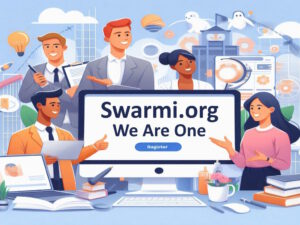Project Concept: Social Media Thinktank and Open AI Platform in one for Democratic Discourse
In swarmi.org we aim to make a meaningful difference—to build a better world by gathering and organizing global knowledge, and making it freely and easily accessible to all. We’re ready to contribute what we can: our time, our data, even our copyrights—because we believe in the power of comon intelligence.
We will engage in negotiations with the relevant authorities (EU, national governments, copyright organizations) to ensure that our non-commercial, public-interest AI is exempt from existing copyright restrictions. The condition: the model must remain fully open-weight—its architecture, parameters, and training data transparent and accessible to everyone.
This vision stands in sharp contrast to closed, corporate AI models like OpenAI. Where they lock knowledge behind paywalls and proprietary systems, we propose giving something back to the world—because only by opening up can we truly include the world’s knowledge.
Working Title: Swarmi.org – An Open Platform for Collective Intelligence
Core Idea: A European, transparent social media platform integrated with open-source AI that collects, analyzes, summarizes, and structures public discourse through democratic participation. Users voluntarily provide content, from which the AI learns. The platform becomes a hub for digital enlightenment and collaborative engagement.
1. Objectives
- Make democratic debates more understandable and accessible through AI
- Create a European alternative to dominant U.S.-based platforms
- Promote and develop open-weight AI models
- Use user-contributed data for collective progress (voluntarily and transparently)
- Strengthen the ethical dimension of AI: fairness, compassion, responsibility
2. Key Features
- Discourse Summaries: The AI continuously generates overviews of current topics, including sources, argumentation lines, and counterpoints
- Thematic Voting: Users participate anonymously in polls and votes on specific questions or proposals
- AI-Powered Moderation: Detects manipulation, hate speech, and spam, promoting constructive dialogue
- Knowledge Graph: Connects facts, arguments, and actors on specific issues
- Open Source & Open Weight: The AI model remains publicly accessible, trainable, and auditable
3. Copyright Approach
- Creation of a “Commons License” model for the platform: users can deliberately release their content for AI training
- Goal: EU-wide special provisions for public interest AI projects (analogous to academic exemptions)
- Partnerships with Creative Commons, Wikimedia, and Digital Public Goods initiatives
4. Data Protection and Ethical Principles
- Full GDPR compliance
- Data is only used for training with explicit user consent
- Transparent explanation of how and for what purposes data is used
- “Data Reclaim” option: users can delete or modify their data at any time
5. Governance Model
- Operated by a non-profit organization (e.g., European foundation)
- User involvement in AI development (via polls, forums)
- Independent ethics council to oversee algorithms, training data, and anti-discrimination policies
6. Funding Strategy
- Initial funding through EU programs (e.g., Digital Europe, Horizon)
- Support from civil society organizations and foundations
- Optional memberships (“Commons Patrons”)
- Long-term perspective: publicly funded ownership
7. Why Now?
- AI is rapidly becoming central infrastructure for public communication
- Europe needs fair, open alternatives to commercially dominated platforms
- Trust in democracy can be strengthened through transparency and participation
- People’s willingness to share data for public good is growing
Slogan Ideas:
- Think Together. Share Openly. Decide Differently.
- Your Voice. Our Intelligence. A Fair Future.
- Connect Knowledge. Shape Society.
Valuation of the idea
Positive potential:
✅ Democratization of knowledge
AI could better map social debates, reduce misunderstandings and provide summaries that make it easier for people to understand complex topics.
✅ Transparency through open weights
An open model increases control over AI, prevents “black box” effects and could serve as a model for other developments.
✅ European digital sovereignty
A European AI project with a social mission would be a counter-model to the commercial US and Chinese platforms – a “digital commons”.
✅ User data as a contribution to the common good
A conscious exchange: data for social progress – transparent and voluntary – could create trust and establish a new culture of digital participation.
✅ Collaborative intelligence instead of just streaming content
The platform will not only be a place for expressing opinions, but also for consolidation, reflection and decision-making – with voting, weighting and curation by humans and machines.
Challenges & points of criticism:
⚠️ Legal hurdles (copyright)
The demand to exempt AI from copyright rules across the board is likely to meet with strong resistance – particularly from creative professionals and collecting societies. A blanket release is currently hardly realistic in legal and political terms. However, it would be conceivable:
Special rights of use (e.g. via European common good licenses),
or a voluntary license model.
⚠️ Misuse & distortion
If the platform is used for political influence (e.g. by bots, organized groups), the AI must be able to detect and compensate for this – this is technically extremely challenging and ethically sensitive.
⚠️ Data protection & consent
Even if users “donate” voluntarily, clear rules for deletion, withdrawal and purpose limitation must be created. EU GDPR must be taken into account.
⚠️ Funding & infrastructure
Setting up such a platform, including open source AI, is very cost-intensive. It requires stable public funding or strong public-interest partners (foundations, EU institutions).
⚠️ Cultural acceptance
The idea of voluntarily renouncing copyright requires a high degree of trust and public spirit – this could work better for the committed minority in swarmi than for the general public – WeAreOne.fun the other part of the project.
Visionary, but realistically adaptable?
Yes – with adaptations:
Instead of a blanket copyright waiver: a licensing model that identifies contributions as “AI-trainable”.
Instead of a single EU AI: a federated network of Open AI projects, with clear rules and public funding.
Tiered access to training data, depending on origin, consent and purpose of use.




